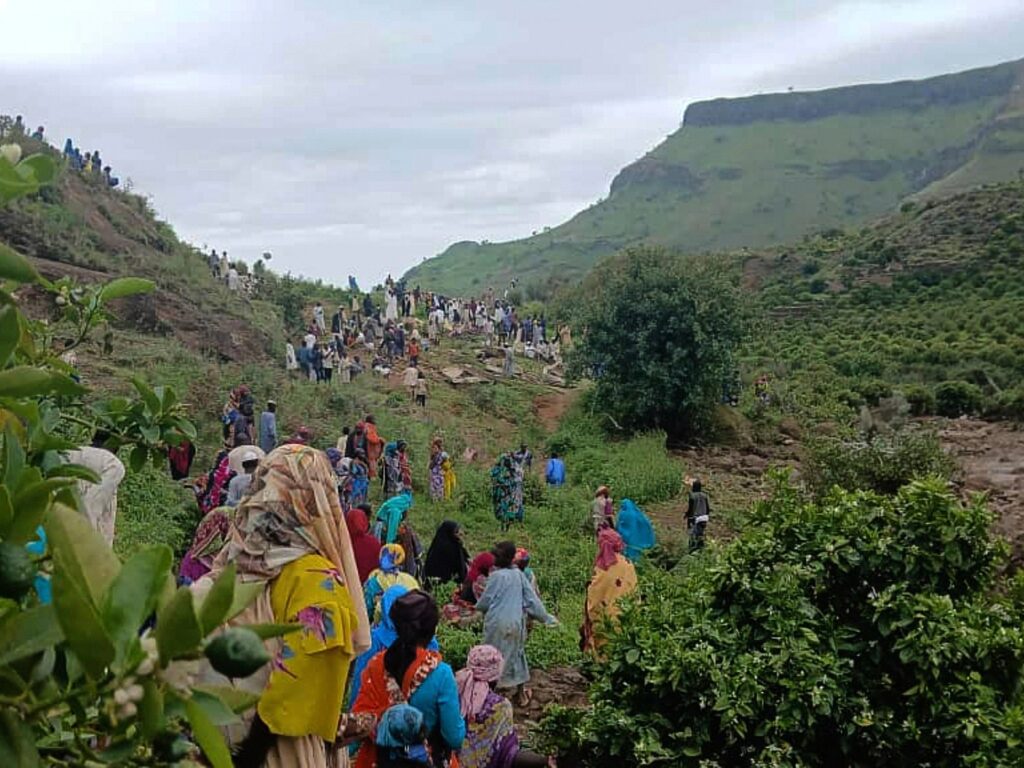Much of the affected region has become mostly inaccessible to the UN and aid groups, with Doctors Without Borders describing the area as a ‘black hole’ in Sudan’s humanitarian response.
Published On 3 Sep 2025
Sudan has appealed for international aid after a landslide destroyed an entire village in the western Darfur region, killing more than 1,000 people in one of the deadliest natural disasters in recent history in the country beset by a brutal civil war.
The village of Tarasin was “completely levelled to the ground,” the Sudan Liberation Movement/Army (SLM/A), the rebel group that controls the area, said as it appealed to the United Nations and international aid groups for help to recover the bodies on Tuesday.
The tragedy happened on Sunday in the village, located in Central Darfur’s Marrah Mountains, after days of heavy rainfall.
“Initial information indicates the death of all village residents, estimated to be more than 1,000 people,” the rebel group said in a statement. “Only one person survived,” it added.
The ruling Sovereign Council in Khartoum said it mourned “the death of hundreds of innocent residents” in the Marrah Mountains landslide. In a statement, it said “all possible capabilities” have been mobilised to support the area.
Luca Renda, the UN humanitarian coordinator in Sudan, said he was “deeply saddened” by the reported landslide, adding that the UN and its partners were mobilising to support affected communities at the scene.
A local emergency network, which has been providing support to communities across Sudan during the war, said its teams recovered the bodies of at least nine people on Tuesday. Search teams were facing challenges to reach the area because of bad weather and a lack of resources, it added.
Mohamed Abdel-Rahman al-Nair, a SLM/A spokesman, told The Associated Press news agency that the village where the landslide took place is remote and accessible only by foot or donkeys.
Tarasin is located in the central Marrah Mountains, a volcanic area with a height of more than 3,000 metres (9,840 feet) at its summit. A World Heritage Site, the mountain chain is known for its lower temperatures and higher rainfall than surrounding areas, according to UNICEF. It is located more than 900 kilometres (560 miles) west of the capital, Khartoum.
Sunday’s landslide was one of the deadliest natural disasters in Sudan’s recent history. Hundreds of people die every year in seasonal rains that run from July to October. Last year’s heavy rainfall caused the collapse of a dam in the eastern Red Sea State, killing at least 30 people, according to the UN.
News of the disaster came as Sudan’s continuing war – now in its third year – plunges the country further into one of the world’s worst humanitarian crises, with famine already declared in parts of Darfur.
People fleeing clashes between the government-aligned Sudanese Armed Forces (SAF) and the paramilitary Rapid Support Forces (RSF) in North Darfur state had sought shelter in the Marra Mountains, and food and medication were in short supply, the Reuters news agency reported.
Much of the region has become mostly inaccessible for the UN and aid groups, with Doctors Without Borders (known by its French acronym MSF) describing the area as a “black hole” in Sudan’s humanitarian response.
The International Organization for Migration on Tuesday called for safe access and the scaling-up of support to the area.
Factions of the SLM/A have pledged to fight alongside the SAF against the RSF.
Fighting has escalated in Darfur, especially in el-Fasher, since the army took control of Khartoum from the RSF in March.
El-Fasher has been under RSF siege for more than a year, as the paramilitary force is seeking to capture the strategic city, the last major population centre held by the army in the Darfur region.
The paramilitaries, who lost much of central Sudan, including Khartoum, earlier this year, are attempting to consolidate power in the west and establish a rival government.
https://www.aljazeera.com/news/2025/9/3/sudan-appeals-for-aid-after-landslide-kills-more-than-1000-in-darfur?traffic_source=rss


